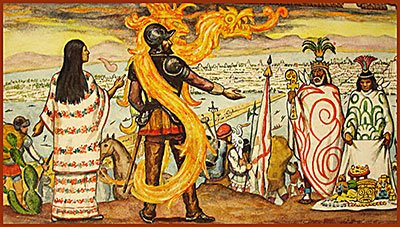There is a myth that Cortes defeated the Aztec Empire with just 500 men and superior weapons. The only problem is that it isn't true.
Cortes had help, organised by Malinalli, the Nahua woman who was Cortes' interpreter (she spoke Mayan and Nahuatl as well as Spanish) and who became the mother of his son and heir.

Malinalli was born in what is known now as the Valley of Mexico, which is the high plateau and eastern side of Mexico which was dominated by Toltecs, Aztecs and a number of other Nahua speaking nations.
At the time Cortes arrived, the Aztecs were brutally subjugating the other Nahua peoples. They frequently made human sacrifices to their gods and these were always chosen from the subjugated/colonised groups. Sometimes the bloodletting was so savage they sacrificed 20,000 people in a single day. We know this both from the records the Aztecs kept and the testimony of the subjugated Nahua peoples.
Naturally all these people (including Malinalli) were bitter at the Aztecs, and when the opportunity came, they forged an alliance with the Spaniards against the Aztecs.
The people of Tlaxcala formed the main part of army aiding Cortes. They were taking a calculated risk. If they sided with the Aztecs, and the Aztecs won, their people would continue to be at risk of human sacrifice, and if they lost while siding with the Aztecs, they would have been subjugated by the Spanish. On the other hand, siding with the Spanish meant getting rid of the Aztecs and brokering a priviledged position for themselves.
So the Tlaxcalan people threw their lot in with Cortes, after Malinalli brokered the alliance, and together they went on to defeat the Aztecs. The Spanish honoured their part of the deal - Tlaxcala was exempt from the pillaging and destruction that followed the Spanish conquest.
The Aztecs ended up with their culture wiped out. But in large part this was because they had no allies. When the crunch came, there was no-one to stand with them,
You can see this pattern elsewhere in history. Germany for example was defeated in WW2 because it had no allies (it had turned on it's one ally, the Soviet Union). The Soviets in their turn collapsed because they too had no allies - the Warsaw Pact was not a true alliance but a group of resentful countries kept in the Soviet sphere by force, and who broke away as soon as they were able to.
Britain on the other hand survived for centuries because it did have allies. After the first Brexit in Tudor times, they forged an alliance with the Ottomans that lasted 300 years to WW1, and enabled the fledgling kingdom to trade it's way out of it's problems with Europe.
Britain was also a johnny-come-lately to the empire business, and most of it's empire was forged by making alliances with native kingdoms against the other Europeans. For example, by the 18th century the brutality of the Dutch, Spanish and Portuguse was so infamous that kingdoms in India signed friendship treaties with Britain to get some protection. The deal was that they'd allow Britain to trade with them in return for protection against the Europeans and the preservation of their culture - and Britain largely respected both religion and language (there were no mass conversions and forcible changes of language as in the Spanish Empire), so much so that when WW2 came along, a large number of Indians mobilised to help fight both the Germans and the Japanese who were seen to be huge threats to their culture.
The current superpower, the United States, also has a large number of allies, especially amongst those who were helped with Marshall Aid after WW2.
The interesting thing about China is that it has no friends. None of it's neighbours like them and most fear them. And countries in other parts of the world are wary of them. This suggests to me that China won't be able to make the leap to superpower status because too much of it's energy will get sapped dealing with countries trying to thwart them.
If the United States does cease to be a superpower, they are more likely to be replaced by a country like India, embedded as it is within the alliance of the Commonwealth, and thus with a natural group of friends.